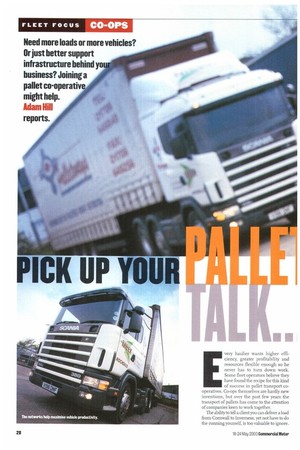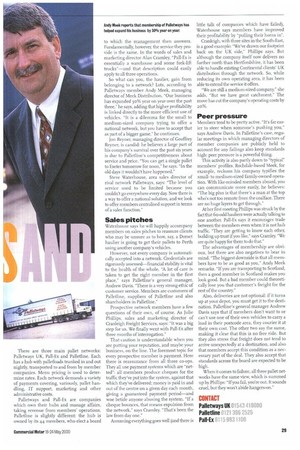IMO Meilk Milli NW 111 E very haulier wants higher efficiency,
Page 30

Page 31

If you've noticed an error in this article please click here to report it so we can fix it.
greater profitability and resources flexible enough so he never has to turn down work. Some fleet operators believe they have found the recipe for this kind of success in pallet transport cooperatives. Co-ops themselves are hardly new inventions, but over the past few years the transport of pallets has come to the attention of companies keen to work together.
The ability to tell a client you can deliver a load from Cornwall to Inverness, yet not have to do the running yourself, is too valuable to ignore. There are three main pallet networks: Palletways UK, Pall-Ex and Palletline. Each has a hub with palletloads trunked in and out nightly, transported to and from by member companies. Menu pricing is used to determine rates. Each network demands a variety of payments covering, variously, pallet handling, IT support, marketing and other administrative costs.
Palletways and Pall-Ex are companies which own their hubs and manage affairs, taking revenue from members' operations. Palletline is slightly different: the hub is owned by its 44 members, who elect a board to which the management then answers. Fundamentally, however, the service they provide is the same. In the words of sales and marketing director Alan Cramley, "Pall-Ex is essentially a warehouse and some fork-lift trucks"—and that description could easily apply to all three operations.
So what can you, the haulier, gain from belonging to a network? Lots, according to Palletways member Andy Meek, managing director of Meek Distribution. "Our business has expanded 30% year on year over the past three," he says, adding that higher profitability is linked directly to the more efficient use of vehicles. "It is a dilemma for the small to medium-sized company trying to offer a national network, but you have to accept that as part of a bigger game," he continues.
Jon Reyner, managing director of Geoffrey Reyner, is candid: he believes a large part of his company's survival over the past six years is due to Palletline's competitiveness about service and price. "You can get a single pallet to Exeter tomorrow for noon," he says. "In the old days it wouldn't have happened."
Steve Waterhouse, area sales director of rival network Palletways, says: "The level of service used to be limited because you couldn't go everywhere every day. Now there is a way to offer a national solution, and we look to offer members centralised support in terms of a sales function."
Sales pitches
Waterhouse says he will happily accompany members on sales pitches to reassure clients who may be unsure as to how, say, a Dorset haulier is going to get their pallets to Perth using another company's vehicles.
However, not every company is automatically accepted into a network. Credentials are rigorously assessed—financial stability is vital to the health of the whole. "A lot of care is taken to get the right member in the first place," says Palletline's general manager, Andrew Davis. "There is a very strong ethic of customer service. Members are customers of Palletline, suppliers of Palletline and also shareholders in Palletline."
Prospective network members have a few questions of their own, of course. As Julie Phillips, sales and marketing director of Cranleip,h Freight Services, says: "It was a big step for us. We finally went with Pall-Ex after three months of interrogation."
That caution is understandable when you are putting your reputation, and maybe your business, on the line. The foremost topic for every prospective member is payment. Here there is reassurance from all three co-ops. They all use payment systems which are "netted": all members produce cheques for the traffic they've put into the system, against that which they've delivered; money is paid in and out of the centre on a given day each month, giving a guaranteed payment period—and woe betide anyone abusing the system. "If a cheque bounces, that means expulsion from the network," says Cramley. "That's been the law from day one."
Assuming everything goes well (and there is little talk of companies which have failed), Waterhouse says members have improved their profitability by "pulling their horns in".
Cranleigh, with three sites in the South-East, is a good example: "We've drawn our footprint back on the UK side," Phillips says. But although the company itself now delivers no further north than Hertfordshire, it has been able to handle existing Continental clients' UK distribution through the network. So, while reducing its own operating area, it has been able to extend the service it offers.
"We are still a medium-sized company," she adds. "But we have great catchment," The move has cut the company's operating costs by 20%.
Peer pressure
Members tend to be pretty active. "It's far easier to steer when someone's pushing you," says Andrew Davis. In Palletline's case, regular meetings in which managing directors of member companies are publicly held to account for any failings also keep standards high: peer pressure is a powerful thing.
This activity is also partly down to "typical" members' profiles. Rochdale-based Meek, for example, reckons his company typifies the smallto medium-sized family-owned operation. With like-minded members aboard, you can communicate more easily, he believes: "The big plus is that there's a man at the top who's not too remote from the coalface. There are no huge layers to get through."
At her first meeting Phillips was struck by the fact that 6o-odd hauliers were actually talking to one another. Pall-Ex says it encourages trade between the members even when it is not hub traffic. "They are getting to know each other, building up trust if you like," says Cramley. "We are quite happy for them to do that."
The advantages of membership are obvious, but there are also negatives to bear in mind. "The biggest downside is that all members have to be as good as you," Andy Meek remarks, "If you are transporting to Scotland, then a good member in Scotland makes you look good. But a bad member could theoretically lose you that customer's freight for the rest of the country."
Also, deliveries are not optional: if it turns up at your depot, you must get it to the destination. Palletline's general manager Andrew Davis says that if members don't want to or can't use one of their own vehicles to carry a load in their postcode area, they courier it at their own cost. The other two say the same, making it clear that this is no free ride. But they also stress that freight does not tend to arrive unexpectedly at a destination, and also that members accept this condition as a necessary part of the deal. They also accept that standards across the board are expected to be high.
When it comes to failure, all three pallet networks have the same view, which is summed up by Phillips: "If you fail, you're out. It sounds cruel, but they won't abide hangers-on."
CONTACT
Palletways UK -543 410000 Palletline 0121 386 2526 Pall-Ex 159831100








































































































